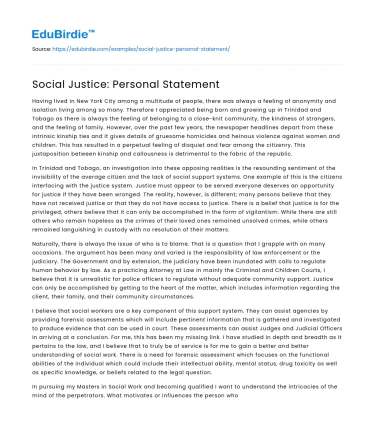Having lived in New York City among a multitude of people, there was always a feeling of anonymity and isolation living among so many. Therefore I appreciated being born and growing up in Trinidad and Tobago as there is always the feeling of belonging to a close-knit community, the kindness of strangers, and the feeling of family. However, over the past few years, the newspaper headlines depart from these intrinsic kinship ties and it gives details of gruesome homicides and heinous violence against women and children. This has resulted in a perpetual feeling of disquiet and fear among the citizenry. This juxtaposition between kinship and callousness is detrimental to the fabric of the republic.
In Trinidad and Tobago, an investigation into these opposing realities is the resounding sentiment of the invisibility of the average citizen and the lack of social support systems. One example of this is the citizens interfacing with the justice system. Justice must appear to be served everyone deserves an opportunity for justice if they have been wronged. The reality, however, is different; many persons believe that they have not received justice or that they do not have access to justice. There is a belief that justice is for the privileged, others believe that it can only be accomplished in the form of vigilantism. While there are still others who remain hopeless as the crimes of their loved ones remained unsolved crimes, while others remained languishing in custody with no resolution of their matters.
Naturally, there is always the issue of who is to blame. That is a question that I grapple with on many occasions. The argument has been many and varied is the responsibility of law enforcement or the judiciary. The Government and by extension, the judiciary have been inundated with calls to regulate human behavior by law. As a practicing Attorney at Law in mainly the Criminal and Children Courts, I believe that it is unrealistic for police officers to regulate without adequate community support. Justice can only be accomplished by getting to the heart of the matter, which includes information regarding the client, their family, and their community circumstances.
I believe that social workers are a key component of this support system. They can assist agencies by providing forensic assessments which will include pertinent information that is gathered and investigated to produce evidence that can be used in court. These assessments can assist Judges and Judicial Officers in arriving at a conclusion. For me, this has been my missing link. I have studied in depth and breadth as it pertains to the law, and I believe that to truly be of service is for me to gain a better and better understanding of social work. There is a need for forensic assessment which focuses on the functional abilities of the individual which could include their intellectual ability, mental status, drug toxicity as well as specific knowledge, or beliefs related to the legal question.
In pursuing my Masters in Social Work and becoming qualified I want to understand the intricacies of the mind of the perpetrators. What motivates or influences the person who commits heinous crimes in need of intensive mental health services? Unfortunately, many however many never been adequately diagnosed or treated.
As a social worker I would also be able to demonstrate a level of impartiality in gathering information to avoid bias, interpretation of the data as well as, excellent critical thinking skills to assist decision-makers and including judges and attorneys. More importantly, by giving me the opportunity to become a social worker I would demonstrate my excellent writing skills which would be used to construct comprehensive and detailed reports. Along with my myriad of skills I have a sense of ingenuity and a willingness to help seek social justice for the vulnerable.






 Stuck on your essay?
Stuck on your essay?

